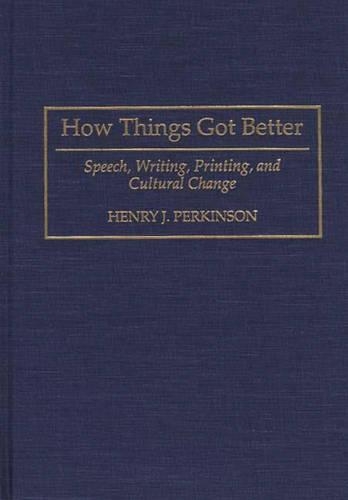
How Things Got Better: Speech, Writing, Printing, and Cultural Change
(Hardback)
Publishing Details
How Things Got Better: Speech, Writing, Printing, and Cultural Change
By (Author) Henry Perkinson
Bloomsbury Publishing PLC
Praeger Publishers Inc
25th April 1995
United States
Classifications
Tertiary Education
Non Fiction
Society and Social Sciences
302.209
Physical Properties
Hardback
192
Description
A highly original interpretation of the history of Western culture that presents a first in-depth analysis of the cultural impact of communication. Explains how the media have helped bring about economic, political, social, and intellectual progress. Adopting the currently unfashionable theory that Western culture has improved over time, Perkinson argues that media of communication have played a pivotal role in helping to make things better. He shows how human speech, when it first emerged, enabled people both to understand better the world they inhabited and to construct political, economic, and social arrangements that improved their life chances. With the invention of writing in Sumer, and especially following the invention of the phonetic alphabet in Greece, people were able to devise even better understandings and improved arrangements. The invention of the printing press in the late 15th century led to the creation of the modern nation state, capitalism, an open society, and modern science. According to this novel interpretation, media of communication encode the existing culture, thereby enabling people to become critical of it in ways not possible before. This criticism uncovers inadequacies, which, when eliminated, result in an improved culture. This book will be of interest to students and researchers of the history of communications and Western civilization.
Reviews
Overall, the book is a readable historical account of the roots of modern mass media...his discussion of the economic and political impact of the printing press, a subject scholarship often neglects, is interesting. Recommended for academic collections at all levels.-Choice
"Overall, the book is a readable historical account of the roots of modern mass media...his discussion of the economic and political impact of the printing press, a subject scholarship often neglects, is interesting. Recommended for academic collections at all levels."-Choice
Author Bio
HENRY J. PERKINSON is a Professor in the Department of Culture and Communication, New York University./e He has written extensively on educational history and educational theory, including Learning From Our Mistakes (Greenwood, 1984). He has also published Getting Better: Television and Moral Progress (1991).
